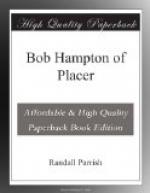His inquiring gaze swept thoughtfully over the expectant faces of his troop commanders. “That will be all at present, gentlemen; you will require no further instructions until we deploy. Captain Calhoun, just a word, please.”
The officer thus directly addressed, a handsome, stalwart man of middle age, reined in his mettlesome horse and waited.
“Captain, the messenger who has just brought us despatches from Cheyenne is a civilian, but has requested permission to have a share in this coming fight. I have assigned him to your troop.”
Calhoun bowed.
“I thought it best to spare you any possible embarrassment by saying that the man is not entirely unknown to you.”
“May I ask his name?”
“Robert Nolan.”
The strong, lion-like face flushed under its tan, then quickly lit up with a smile. “I thank you. Captain Nolan will not suffer at my hands.”
He rode straight toward his troop, his eyes searching the ranks until they rested upon the averted face of Hampton. He pressed forward, and leaned from the saddle, extending a gauntleted hand. “Nolan, old man, welcome back to the Seventh!”
For an instant their eyes met, those of the officer filled with manly sympathy, the other’s moistened and dim, his face like marble. Then the two hands clasped and clung, in a grip more eloquent than words. The lips of the disgraced soldier quivered, and he uttered not a word. It was Calhoun who spoke.
“I mean it all, Nolan. From that day to this I have believed in you,—have held you friend.”
For a moment the man reeled; then, as though inspired by a new-born hope, he sat firmly erect, and lifted his hand in salute. “Those are words I have longed to hear spoken for fifteen years. They are more to me than life. May God help me to be worthy of them. Oh, Calhoun, Calhoun!”
For a brief space the two remained still and silent, their faces reflecting repressed feeling. Then the voice of command sounded out in front; Calhoun gently withdrew his hand from the other’s grasp, and with bowed head rode slowly to the front of his troop.
In column of fours, silent, with not a canteen rattling, with scabbards thrust under their stirrup leathers, each man sitting his saddle like a statue, ready carbine flung forward across the pommel, those sunburnt troopers moved steadily down the broad coulee. There was no pomp, no sparkle of gay uniforms. No military band rode forth to play their famous battle tune of “Garryowen”; no flags waved above to inspire them, yet never before or since to a field of strife and death rode nobler hearts or truer. Troop following troop, their faded, patched uniforms brown with dust, their campaign hats pulled low to shade them from the glare, those dauntless cavalrymen of the Seventh swept across the low intervening ridge toward the fateful plain below. The troopers riding at either side of Hampton, wondering still at their captain’s peculiar words and action, glanced curiously at their new comrade, marvelling at his tightly pressed lips, his moistened eyes. Yet in all the glorious column, no heart lighter than his, or happier, pressed forward to meet a warrior’s death.




